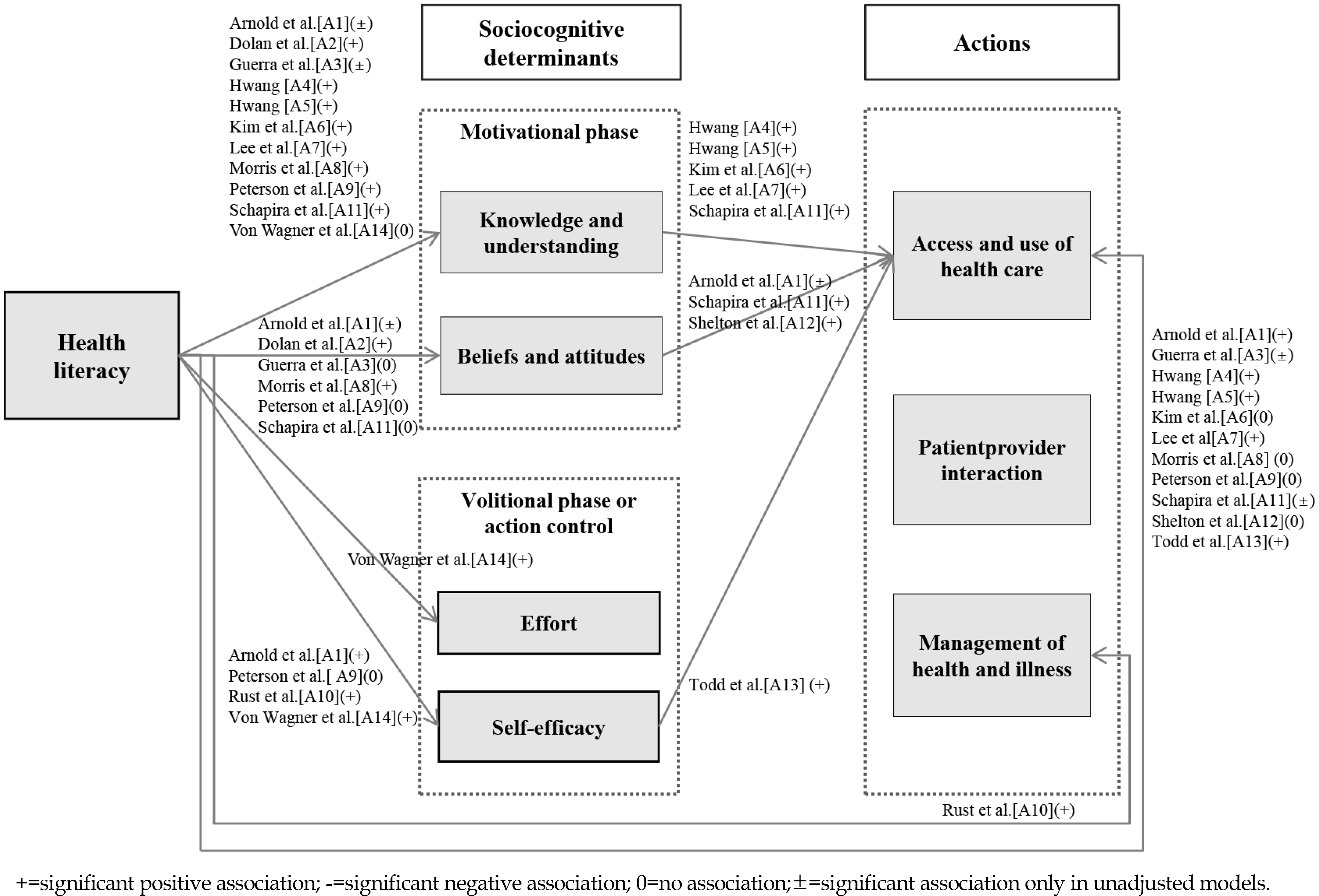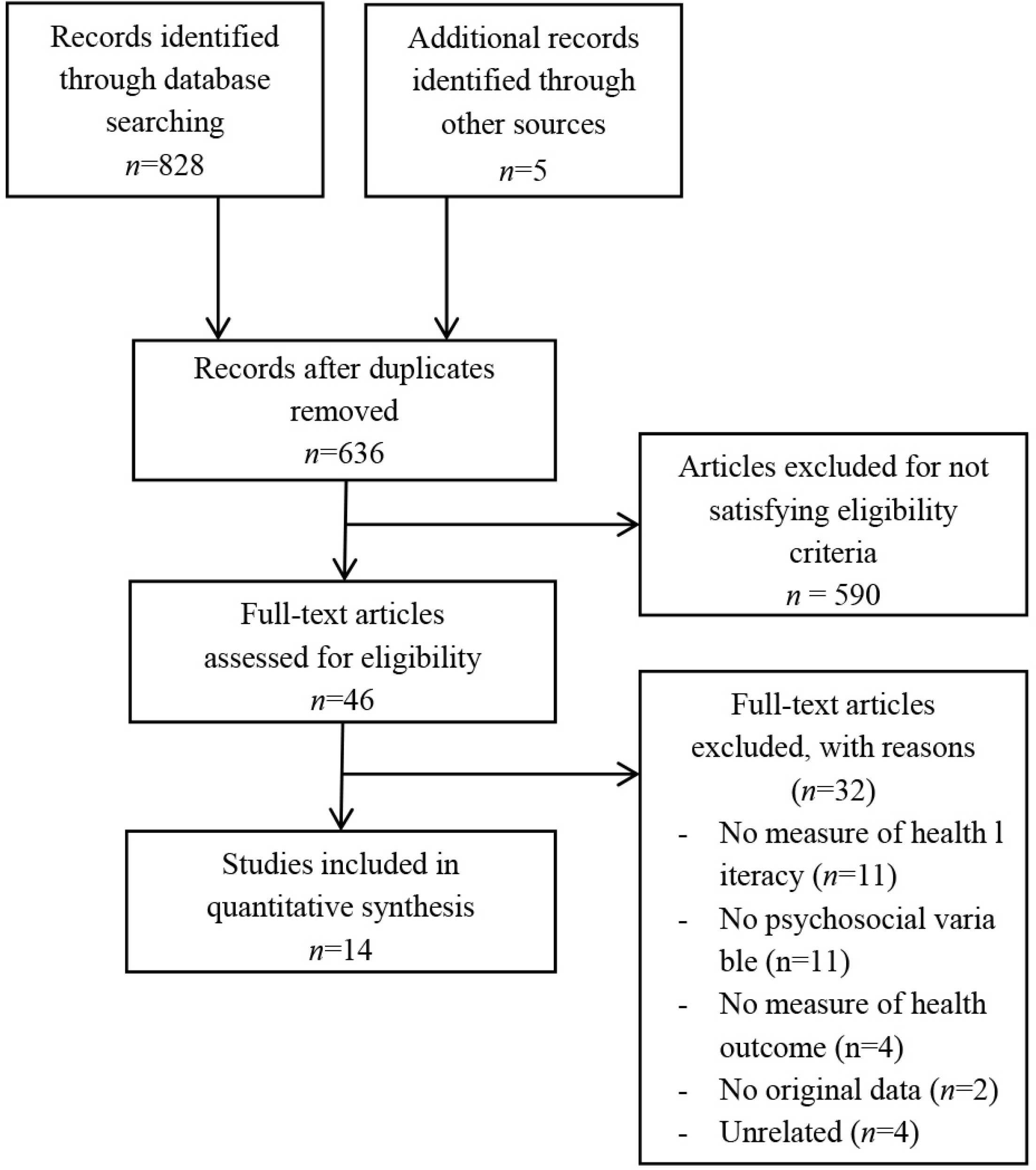Abstract
Purpose
The purpose of the study was to systematically review the associations among health literacy, psychosocial factors, and cancer-related health actions.
Methods
PubMed, CINAHL, PsycARTICLES, KISS, RISS, and KoreaMed were searched for articles published between January 2000 and March 2018. Fourteen studies were identified and reviewed for the associations among the variables based on Von Wagner's framework on health literacy and health actions. Two researchers reviewed the articles independently using the Mixed Methods Appraisal Tool.
Results
Of the 14 relevant studies, five studies analyzed all of the associations among health literacy, motivational or volitional factors, and cancer-related health actions. Eleven studies investigated the association between health literacy and motivational factors, including knowledge (n=11) and attitudes (n=6). Four studies investigated the association between health literacy and volitional factors, including self-efficacy (n=4) and efforts to search cancer-related information (n=1).
Go to : 
REFERENCES
1. Fitzmaurice C, Allen C, Barbers RM, Barregard L, Bhutta ZA, Brenner H, et al. Global, regional, and national cancer incidence, mortality, years of life lost, years lived with disability, and disability-adjusted life-years for 32 cancer groups, 1990 to 2015: a systematic analysis for the global burden of disease study. Journal of the American Medical Association Oncology. 2017; 3(4):524–48. https://doi.org/10.1001/jamaoncol.2016.5688.
2. Statistics Korea. Annual report on the cause of death statistics [Internet]. Daejeon: Statistics Korea;2016. [cited 2017 Jun 20]. Available from:. http://www.index.go.kr/potal/main/EachDtlPageDetail.do?idx_cd=2770.
3. National Cancer Information Center [Internet]. Seoul: National Cancer Information Center;2013. [cited 2017 Jun 20]. Available from:. https://www.cancer.go.kr/lay1/S1T200C201/contents.do.
4. Kim NS, Lee KE. Factors affecting cancer preventive behavior in middle-aged people. Journal of Korean Academy of Funda-mentals of Nursing. 2014; 21(1):29–38. https://doi.org/10.7739/jkafn.2014.21.1.29.

5. Miller KD, Siegel RL, Lin CC, Mariotto AB, Kramer JL, Row-land JH, et al. Cancer treatment and survivorship statistics, 2016. A Cancer Journal for Clinicians. 2016; 66(4):271–89. https://doi.org/10.3322/caac.21349.

6. Cutilli CC. Health literacy in geriatric patients: an integrative review of the literature. Orthopaedic Nursing. 2007; 26(1):43–8. https://doi.org/10.1097/00006416-200701000-00014.
7. Nielsen-Bohlman L, Panzer AM, Kindig DA. Health literacy: a prescription to end confusion. Washington: National Academies Press;2004. p. 331.
8. Cho YI, Lee SYD, Arozullah AM, Crittenden KS. Effects of health literacy on health status and health service utilization amongst the elderly. Social Science & Medicine. 2008; 66(8):1809–16. https://doi.org/10.1016/j.socscimed.2008.01.003.

9. Oldach BR, Katz ML. Health literacy and cancer screening: a systematic review. Patient Education & Counseling. 2014; 94(2):149–57. https://doi.org/10.1016/j.pec.2013.10.001.

10. Morris NS, Field TS, Wagner JL, Cutrona SL, Roblin DW, Gaglio B, et al. The association between health literacy and cancer-related attitudes, behaviors, and knowledge. Journal of Health Communication. 2013; 18(supl):223–41. https://doi.org/10.1080/10810730.2013.825667.

11. Dolan NC, Ferreira MR, Davis TC, Fitzgibbon ML, Rademaker A, Liu D, et al. Colorectal cancer screening knowledge, attitudes, and beliefs among veterans: does literacy make a difference? Journal of Clinical Oncology. 2004; 22(13):2617–22. https://doi.org/10.1200/jco.2004.10.149.

12. Guerra CE, Krumholz M, Shea JA. Literacy and knowledge, attitudes and behavior about mammography in Latinas. Journal of Health Care for the Poor and Underserved. 2005; 16(1):152–66. https://doi.org/10.1353/hpu.2005.0012.

13. Todd L, Harvey E, Hoffman-Goetz L. Predicting breast and colon cancer screening among English-as-a-second-language older Chinese immigrant women to Canada. Journal of Cancer Education. 2011; 26(1):161–9. https://doi.org/10.1007/s13187-010-0141-7.

14. Schapira MM, Neuner J, Fletcher KE, Gilligan MA, Hayes E, Laud P. The relationship of health numeracy to cancer screening. Journal of Cancer Education. 2011; 26(1):103–10. https://doi.org/10.1007/s13187-010-0133-7.

15. Lee SYD, Tsai TI, Tsai YW, Kuo KN. Health literacy and women's health-related behaviors in Taiwan. Health Education & Behavior. 2012; 39(2):210–8. https://doi.org/10.1177/1090198111413126.

16. Hwang H. Impacts of colorectal cancer knowledge and health literacy on self-management behaviors among elderly women in rural areas. Korean Journal of Adult Nursing. 2017; 29(5):527–35. https://doi.org/10.7475/kjan.2017.29.5.527.

17. Hwang H. Health literacy, cancer knowledge, and cancer preventive behaviors among rural older adults. Asian Oncology Nursing. 2016; 16(4):234–41. https://doi.org/10.5388/aon.2016.16.4.234.

18. Kim K, Han HR. Potential links between health literacy and cervical cancer screening behaviors: a systematic review. Psycho-Oncology. 2016; 25(2):122–30. https://doi.org/10.1002/pon.3883.

19. S⊘rensen K, Van den Broucke S, Fullam J, Doyle G, Pelikan J, Slonska Z, et al. Health literacy and public health: A systematic review and integration of definitions and models. BMC Public Health. 2012; 12(80):https://doi.org/10.1186/1471-2458-12-80.

20. Manganello JA. Health literacy and adolescents: a framework and agenda for future research. Health Education Research. 2007; 23(5):840–7. https://doi.org/10.1093/her/cym069.

21. Squiers L, Peinado S, Berkman N, Boudewyns V, McCormack L. The health literacy skills framework. Journal of health communication. 2012; 17(sup3):30–54. https://doi.org/10.1080/10810730.2012.713442.

22. Von Wagner C, Steptoe A, Wolf MS, Wardle J. Health literacy and health actions: a review and a framework from health psy-chology. Health Education & Behavior. 2009; 36(5):860–77. https://doi.org/10.1177/1090198108322819.

23. Higgins JPT, Green S. Cochrane handbook for systematic reviews of interventions version 5.1.0. London: the Cochrane Collaboration;2011.
24. Moher D, Liberati A, Tetzlaff J, Altman DG. Preferred reporting items for systematic reviews and meta-analyses: the PRI SMA statement. International Journal of Surgery. 2010; 8(5):336–41. https://doi.org/10.1016/j.ijsu.2010.02.007.
25. Pluye P, Robert E, Cargo M, Bartlett G, O'cathain A, Griffiths F, et al. Proposal: a mixed methods appraisal tool for systematic mixed studies reviews. [Internet]. Montreal: McGill University;2016. [cited 2016 Jul 20]. Available from:. http://mixedmethodsappraisaltoolpublic.pbworks.com.
26. Tokdemir G, Kav S. The effect of structured education to patients receiving oral agents for cancer treatment on medication adherence and self-efficacy. Asia-Pacific Journal of Oncology Nursing. 2017; 4(4):290–8. https://doi.org/10.4103/apjon.apjon_35_17.

Appendix 1. Studies Included in Systematic Review
A1. Arnold CL, Rademaker A, Bailey SC, Esparza JM, Reynolds C, Liu D, et al. Literacy barriers to colorectal cancer screening in community clinics. Journal of Health Communication. 2012; 17(sup3):252–64. https://doi.org/10.1080/10810730.2012.713441.

A2. Dolan NC, Ferreira MR, Davis TC, Fitzgibbon ML, Rademaker A, Liu D, et al. Colorectal cancer screening knowledge, attitudes, and beliefs among veterans: does literacy make a difference? Journal of Clinical Oncology. 2004; 22(13):2617–22. https://doi.org/10.1200/jco.2004.10.149.

A3. Guerra CE, Krumholz M, Shea JA. Literacy and knowledge, attitudes and behavior about mammography in Latinas. Journal of Health Care for the Poor and Underserved. 2005; 16(1):152–66. https://doi.org/10.1353/hpu.2005.0012005.0012.

A4. Hwang H. Health literacy, cancer knowledge, and cancer preventive behaviors among rural older adults. Asian Oncology Nursing. 2016; 16(4):234–41. https://doi.org/10.5388/aon.2016.16.4.23.

A5. Hwang H. Impacts of colorectal cancer knowledge and health literacy on self-management behaviors among elderly women in rural areas. Korean Journal of Adult Nursing. 2017; 29(5):527–35. https://doi.org/10.7475/kjan.2017.29.5.527.

A6. Kim NS, Lee KE. Factors affecting cancer preventive behavior in middle-aged people. Korean Academy of Fundamen-tals of Nursing. 2014; 21(1):29–38. https://doi.org/10.7739/jkafn.2014.21.1.29.

A7. Lee SYD, Tsai TI, Tsai YW, Kuo KN. Health literacy and women's health-related behaviors in Taiwan. Health Education & Behavior. 2012; 39(2):210–8. https://doi.org/10.1177/1090198111413126.

A8. Morris NS, Field TS, Wagner JL, Cutrona SL, Robin DW, Gaglio B, et al. The association between health literacy and cancer-related attitudes, behaviors, and knowledge. Journal of Health Communication. 2013; 18(sup1):223–41. https://doi.org/10.1080/10810730.2013.825667.

A9. Peterson NB, Dwyer KA, Mulvaney SA, Dietrich MS, Roth-man RL. The influence of health literacy on colorectal cancer screening knowledge, beliefs and behavior. Journal of the National Medical Association. 2007; 99(10):1105–12.
A10. Rust CF, Davis C, Moore MR. Medication adherence skills training for African-American breast cancer survivors: the effects on health literacy, medication adherence, and self-efficacy. Social Work in Health Care. 2015; 54(1):33–46. https://doi.org/10.1080/10810730.2012.713441.

A11. Schapira MM, Neuner J, Fletcher KE, Gilligan MA, Hayes E, Laud P. The relationship of health numeracy to cancer screening. Journal of Cancer Education. 2011; 26(1):103–10. https://doi.org/10.1007/s13187-010-0133-7.

A12. Shelton RC, Jandorf L, Ellison J, Villagra C, DuHamel KN. The influence of sociocultural factors on colonoscopy and FOBT screening adherence among low-income Hispanics. Journal of Health Care for the Poor and Underserved. 2011; 22(3):925. https://doi.org/10.1353/hpu.2011.0074.

Go to : 
 | Figure 1.Findings of the literature based on the framework of the Von Wagner's health literacy and health action. |
Table 1.
Overview of Studies on the Associations of Health Literacy, Social Cognitive and Psychological Variables, and Cancer- related Health Behaviors
Table 2.
Study Quality Assessment




 PDF
PDF ePub
ePub Citation
Citation Print
Print



 XML Download
XML Download